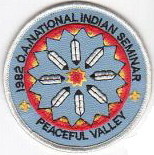 The fourth National Indian Seminar was held from July 31-August 7, 1982 at Peaceful Valley Scout Ranch near Elbert, Colorado, roughly 70 miles south of Denver. Approximately 145 Indian enthusiasts from lodges around the country, as well as 55 staff members participated in the weeklong event. In keeping with tradition established at previous seminars, the main focus of the event was the training and education of Arrowmen on Native American customs, culture, and traditions. Once again National OA Committee member and Lead Adviser for Indian Events, Don Thom along with OA Executive Secretary, Bill Downs together served as co-directors of the seminar. National OA Committee member Greg Guy continued to serve in his role as the seminar’s Program Director. The seminar’s administrative leaders were able to secure a sufficient number of highly qualified staff to ensure participants the opportunity to learn about a wide range of topics, and the chance to work with both Indian and non-Indian instructors on a one-on-one basis.
The fourth National Indian Seminar was held from July 31-August 7, 1982 at Peaceful Valley Scout Ranch near Elbert, Colorado, roughly 70 miles south of Denver. Approximately 145 Indian enthusiasts from lodges around the country, as well as 55 staff members participated in the weeklong event. In keeping with tradition established at previous seminars, the main focus of the event was the training and education of Arrowmen on Native American customs, culture, and traditions. Once again National OA Committee member and Lead Adviser for Indian Events, Don Thom along with OA Executive Secretary, Bill Downs together served as co-directors of the seminar. National OA Committee member Greg Guy continued to serve in his role as the seminar’s Program Director. The seminar’s administrative leaders were able to secure a sufficient number of highly qualified staff to ensure participants the opportunity to learn about a wide range of topics, and the chance to work with both Indian and non-Indian instructors on a one-on-one basis.
The seminar’s cost was $125.00 per participant. The fee included food, lodging and most significantly, expert instruction in Indian singing, various styles of dancing, crafts, regalia, history, and customs. Instruction was also given to participants on all of the main Indian groups of the United States, however it was understood by the seminar’s administrative staff that most Indian hobbyists have a special interest in a particular tribe or culture. To service those individual interests, time was allotted at the seminar so that participants were able to concentrate on whatever special area of Native American history they desired. Various cultural areas were once again featured at the fourth National Indian Seminar, and they included those of the Northern & Southern Plains, Northeastern, and Southeastern Indians.